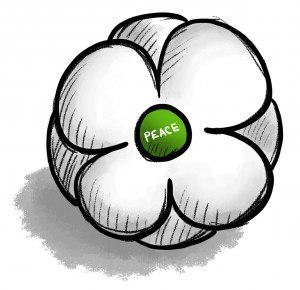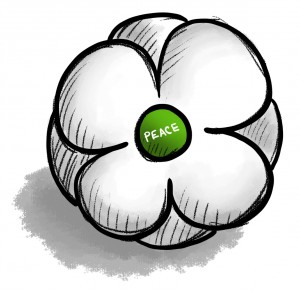White poppies spark controversy


A controversial campaign in Ottawa has students and professionals largely divided.
The political stir was caused by a “white poppy” campaign for Remembrance Day that promoted an ideology much different than the Royal Canadian Legion’s red poppy.
Supporters of the campaign claim that the red poppy glorifies war and violence, saying that a white poppy promotes peace and social unity.
However, the campaign has received much negative backlash. Especially from war veterans.
“What can you really say about war, you do what you have to do,” said Lloyd James Hart, a World War II veteran. “The idea [behind the poppy] is if you have a pin in it that’s a symbol of a fallen comrade and you’re supposed to replace your fallen comrade.”
“When I wear my poppy I remember.”
Last year, Canadians wore 18 million red poppies. Proceeds raised over $14 million for different veteran services.
“It’s to remember what we did,” Hart continued. “Other than that, what else could we say?”
Today, organizations such as the Canadian Voice of Women for Peace make white poppies and hand them out for free. The argument in favour of the white poppy explains that the symbol is a pledge to work towards peace and stray away from violence and war.
“There’s nothing wrong with people coming in with their own ideas and beliefs,” Hart explained. “But this is Canada.”
Politicians have also joined in with the debate, voicing their opinions on the sensitive topic.
Catherine Fife, the MPP for the Kitchener-Waterloo area, explained that she was in favour of the red poppy as it is a long-standing Canadian tradition.
“If you have something that is working then you shouldn’t have to introduce something else,” she said. “It was the same thing a few years ago when family members wanted to wear the medals of vets.” “There are strong traditions within this sector and I think that those traditions exist for a reason.”
The white poppy campaign has even sparked flames in Federal Parliament as certain politicians are being accused of supporting the campaign.
On Nov. 6 in Parliament, James Bezan brought up a controversial issue that NDPMP Alexandre Boulerice had previously claimed that the First World War veterans fought a “capitalist war on the backs of the workers and peasants” in a blog post.
The Cord briefly spoke with Boulerice in Ottawa and asked him about his position on the white poppy campaign.
“I don’t know what this is really about, everybody can see that I’m proudly having the red [poppy] on in souvenir and remembrance of my grandfather, who was a member of the Canadian forces during WWII,” he said. “He was very proud of that and was very proud of him like all the veterans.”
Students have also been particularly vocal about the campaign, with many in Ottawa sporting the white symbol.
Jamie Nokes, a student at the University of Ottawa explained the presence of the white poppy on his campus.
“People have started a small social group within Ottawa that is trying to alter everyone’s perception on Remembrance Day,” he said. “These people are claiming that red poppies promote the thought and exercise of war.”
He continued, “I think due to a 21st century culture of mass media and social networking we all have this narcissistic tendency to speak about every little thing in our mind and that is just a slippery slope because it enables over analyzing situations more than they need to be.”
The white poppy campaign aimed to distribute about 2,500 white poppy pins throughout the week as well as during the Ottawa Remembrance Day ceremony.
With files from H.G. Watson

